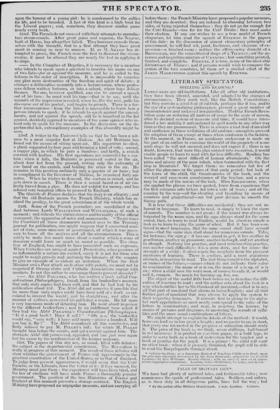SPELLING AND READING.*
LITERARY SPECTATOR.
LANGUAGES are old institutions. Like all other old institutions, they have been altered, amended, and adapted to the changes of circumstances. They work well, like the British Constitution ; but they contain a good died of rubbish, perhaps like it too, and to the eye of a systematizing philosopher, present a great number of inconsistencies and awkward irregularities. Had time French Revo- lution gone on reducing all matters of usage to the scale of reason, after its decimal system of measure and time, it would have intro- duced a law making it anti-national to spell words in any other way than as they are pronounced. There is always a vast deal of mischief and confusion in these violations of old custom—enough to prevent the adoption of them except at times when confusion is the fashion. At this moment, in France, an assiduous endeavour is made on the part of an author to convince the world of the propriety of some such step: he will not succeed, and does not expect it : there is no doubt, however, that were this plan carried into execution, it would enable people to learn to read with far less difficulty. Reading has been called " the most difficult of human attainments." Oh the pains and misery of the poor infant, when tormented with the first step in literature ! We forget them : we remember but few of either the pleasures or the pains of that early period : but look at the tears of the child, the thunth-marks of the book, and the wearied and care-worn countenance of the teacher, and a guess may be made of the nature of the task. Miss EposavoaTH, when she applied the phrase we have quoted, knew from experience that the first entrance into letters led into a vale of tears ; and all the coaxing by the way—all the cheating and beguiling by means of counters and gingerbread—axe but poor devices to smooth the thorny path. It is true that these difficulties are accidental ; they are not in- herent in language. To learn to read, is simply to learn the signs of sounds. The number is not great : if the sound was always in- terpreted by the same sie.n, and the sign always stood for the same sound, then, to learn to read English, .would be about as simple a task as to learn to play the game of whist. But it has been con- trived in most languages, that the smile sound shall have several signs—that the same sign shall stand for numerous sounds. Take, for instance, the sign g : it has one sound in get, it has another in gentleman, another in grammar, another in tough. and yet another in though. Nothing but practice, and most unint crest ing practice, can minister such difficulties : it is a stern duty, and far above the strength of a child : it often repels the neon] tete from the pleasant mysteries of learning. There is another, mid a most gratuitous obstacle, in teaching to read. Time first I kin.- taught is the alphabet, or names of the letters,—names which do not indicate their value in combination : the name of in is em, the name of a is ay, of n is en ; when a child sees the word man, of course he calls it, or would call it, emayen. So much for learning ay, bee, see. The object of time useful little book before us, is to reduce the diffi- culties of learning to read ; and the author sets about the task in a way which entitles her to the thanksof all mankind,—that is to say, all that part of mankind that glories in tieing English; and all that further part of mankind that may choose to apply the system to then' respective languages. It consists first in giving to the alpha- bet such appellations as most nearly correspond to the value of the letters in combination ; and next, in assisting the learner, by means of pictures and diagrams, in mastering the sounds of sylla- bles and the more usual combinations of letters.
We might attempt to explain the details of the method : it would, however, lead us to too great a length ; and we prefer to say in short, that every one interested in the progress of education should study it. The price of the book is, we think, seven shillings, halt-bound in red morocco: it is printed on excellent paper, in a bold type, in order to serve both as a book of instruction for lime leacher and a book of practice for the pupil. It is a printer : the child will want no other book : when it is properly thumbed, the pupil will be able to read the Encyclopedia through aloud.
* Syllabic suelling; or a Summary Method of Teaclihm (711ildren to Head, upon the principle irigi flatly discovered by the Sieur Berth:m(1; adapted to the English Language by Mrs. Williams. Fourth edition ; with an entirely new set of appro- priate copperplate engravings. London, I 529 —'Viii! taker, Treachc r, and Arnot.


















 Previous page
Previous page